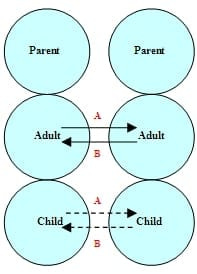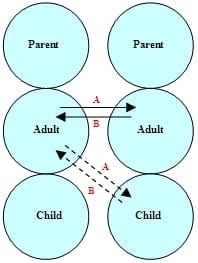Psychological Mind Games
"First we're born, then we die. And there's a whole lotta time to kill in between." This is the basis for Transactional Analysis. How do we "kill the time?"
Psychological mind games are habitual patterns and methods of structuring time and obtaining Strokes. Psychological Games are interpersonal time structuring options sandwiched in between the safer, more superficial option of engaging in Pasttimes and the riskier, more candid option of Authentic Intimacy.
Psychological Mind Games aka: Repetitive Subconscious Programs
NOTE: All the links in this article connect with various areticles on my Blog and other pages on my website: SerenityCreationsOnline.com
Psychological games were first identified and cataloged by Eric Berne M.D., founder of Transactional Analysis in his classic book from the mid-1960’s Games People Play. Berne defined a “Game” as: A patterned and predictable series of transactions which are superficially plausible but actually conceal motivations and lead to a well-defined predictable outcome.
These psychological mind games are habitual [neural networked] programs of behavior that exist in the implicit memory and run subconsciously – beneath the awareness of even the initiator of the game.
In other words, we don’t intentionally engage in these games… In fact, many of us have expressed and/or heard this friendly warning early in a relationship… “I don’t play games”. It’s not a good thing to have a reputation as a “player” or a “tease”. But since healthy intimacy, 24/7, with everyone we know is not possible in our society we have little choice but to engage in various games. (Click on the image below to see a video on the forces that drive us to we create these subconscious programs)
These psychological mind games are not played for fun…They are dysfunctional subconscious programs that have been created by our Little Professor in order to adapt to the dysfunction of our family and obtain strokes — even negative strokes are better than no strokes at all.
The games we play are also, at least partly, the result of the role-modeling of our parents. When we watch them play certain games over and over again we develop the network for that program (Intensity and Repetition). They become part of our Love Map. Many times our parents (subconsciously) even teach us the rules and how to play the games. These teachings are apparent in the Injunctions and Attributions we carry within us throughout life.
Even though many psychological mind games can be harmful, there is always a secondary gain or “payoff” for playing — also known as a positive intention in Parts Integration Therapy. Here is a partial list of possible Payoffs…
To obtain strokes — either negative or positive attention
To protect one from experiences that are believed to cause pain — e.g., trusting others or risking intimacy
To maintain belief systems in a steady-state
To maintain the experience of familiar emotional themes — e.g., a steady-state of abandonment, shame, & contempt
To confirm and maintain an Existential or Psychological Position — e.g., “I’m not ok…you’re ok”
To block intimacy while receiving enough strokes to “get by” — it takes a LOT more negative strokes to get by than positive ones.
To make life and other people predictable
Angular & Duplex Complimentary Transactions
Psychological mind games are played on two levels…the social level (represented by the solid lines) and the psychological level (represented by the dotted lines).
With games, more than two ego states are involved in two complimentary transactions occurring simultaneously…one on a conscious (social) level the other on a subconscious (psychological) level.
Duplex Transactions involve four ego states. (Diagram – Right)
Angular Transactions involve three ego states. (Diagram – Below)
On the social level everything appears to be above board, honest Adult-to-Adult communication… but on the psychological level, a subconscious program stored in the implicit memory is sending a hidden message.
The hidden message is the invitation… or “bait”… from a Child Ego State designed to “hook” a perceived limitation in a Parent or Child Ego State of the receiver of the message.
Key Point: “It takes two to tango”… The partner we choose must know how to play the games we play.
Perceived limitations are identified and “cataloged” through subconscious perception in the partner or mate selection process — what I call the subconscious synchronization of compatible neural networks.
So, on a conscious level Person A… the initiator… appears to be sending a socially acceptable message — while on a subconscious level a psychological mind game is being played.
When the receiver — Person B — responds by taking the bait there is a “switch” in ego states by Person A who gets a surprise feeling or experience (the payoff).
Angular transactions are consciously employed by telemarketers, bill collectors, and door-to-door salesman in order to get the sale or collect the money (payoff). This is probably where the phrase… “What’s your angle?” came from. Perhaps the following will illustrate…
Salesman A – Social or conscious Level… “I think this is the best model, but you probably can’t afford it”. (Verbal message from Adult-to-Adult)Psychological or subconscious level…”It’s not for you”. (Non-verbal para-message from Adult-to-Child)
Customer B – Social or conscious Level… “I’ll take it.” (Verbal message from Adult-to-Adult)Psychological or subconscious level…”I’ll show you! I’m as good as anyone else!” (Non-verbal para-message from Child-to-Adult)
Duplex transactions, those involving four ego states, are the psychological mind games that we are concerned with here… They are played by innocent people on a subconscious or mostly subconscious level.
Let’s take the following example to show how games are passed on from parent to child…(Diagram – Below)
Context: Billy’s mother sat in the living room, talking on the phone with a friend… Suddenly there was a loud crash in the next room… upon entering the room Billy’s mother found the cookie jar had been knocked off the table and onto the floor — Billy was standing next to it.
Mother (M) – Social or conscious Level… “Who did that?”. (Verbal inquiry from Adult-in-the-Adult to the Adult-in-the-Child — aka Little Professor) Psychological or subconscious level… Mother knew that Billy broke the jar and she discounted that she should have child-proofed the room… Her social “fact-finding” question was a subconscious invitation for Billy to lie.
Billy (B) – Social or conscious level…”Sissy did it”.Psychological or subconscious level… Having been witness to mother’s anger before, Billy’s Little Professor creatively came up with a way out…except for one thing, Sissy had left the house with her father to run errands 30 minutes earlier.
Mother (M) – Social or conscious Level… Slaps Billy and yells…”I can’t stand a liar!”. (Switch from Adult to Adapted Child — specifically the Critical Parent ego state to Billy’s Vulnerable Child)Psychological or subconscious level… Mother’s payoff was a surprising feeling of righteous anger that confirmed her strongly held belief that “males cannot be trusted”(M). When her anger had passed the game was over… When she was able to re-activate her Adult and Parent ego states, she felt terrible for “over-reacting”.
In the above example, mother was playing a Persecutor psychological mind game called “Now I’ve Got You, You SOB!”(M) and Billy was learning a Victim game called “Kick Me”(B).
All Billy had to do was say “I did it” and his mother couldn’t play her game. But the Little Professor goes on instinct since it does not yet have the wisdom of experience… the instinct for self-preservation says “stay out of harm’s way”.
Key Point: The sudden shift in ego states by mother provides intensity which, combined with the repetition of playing the game over and over again, will burn the game instructions into a neural network that Billy will likely carry with him into his adult relationships and mate selection process.
In other words, Billy may subconsciously search out and find a partner who knows how to play “Now I’ve Got You, You SOB!” so he can continue to play the “Kick Me” game. It’s in the courtship phase that the subconscious auditions are done — with the use of subconscious perception.
Psychological mind games fit easily into the framework of the Drama Triangle and always include a Victim, Rescuer, and/or Persecutor. They may be played with mild, moderate or severe intensity.
NOTE: All the links in this article connect with various areticles on my Blog and other pages on my website: SerenityCreationsOnline.com





